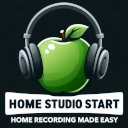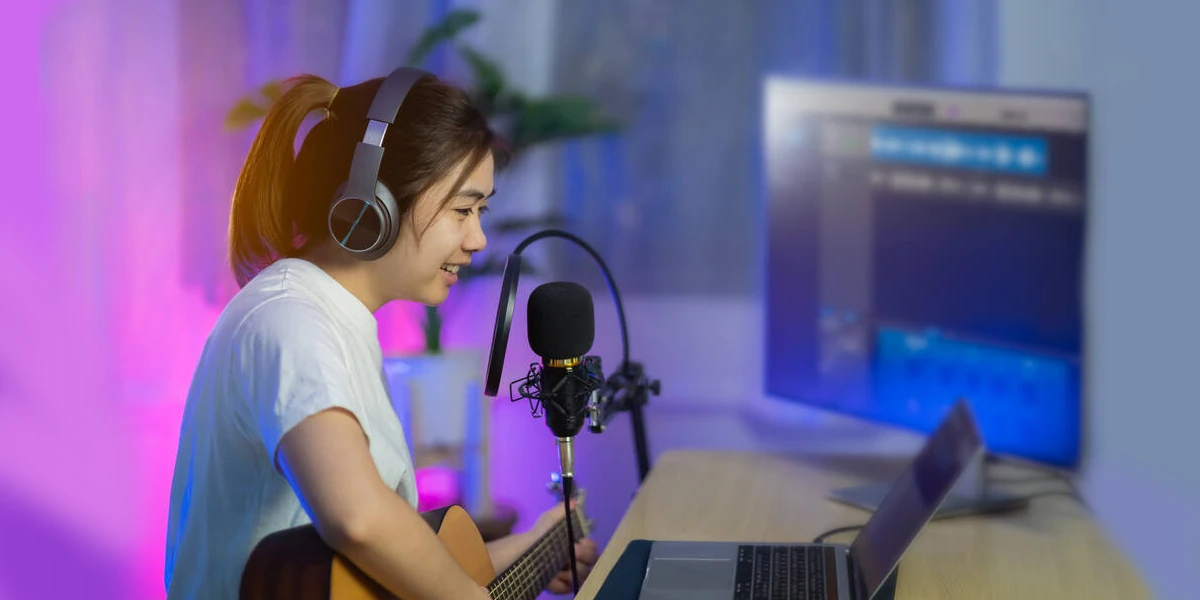Alright, music enthusiasts and future studio wizards! If you’re riding the wave of passion to set up your mini recording studio, you might find yourself swamped with advice and ‘must-dos’ that seem written in stone. Today, we’re here to dissect and debunk three common myths that are nothing more than sound illusions. These are the kind of myths that can turn your studio dreams into a seemingly complex puzzle. But fear not!
By the end of this post, you’ll see that these misconceptions should be left behind, making your path forward clearer and your determination stronger. Achieving your recording haven is within reach, and I’m here to help guide you every step of the way. Let’s get your home studio out of the limbo of planning and into the realm of reality!
Myth #1: The Quest for ‘Dry Sound’
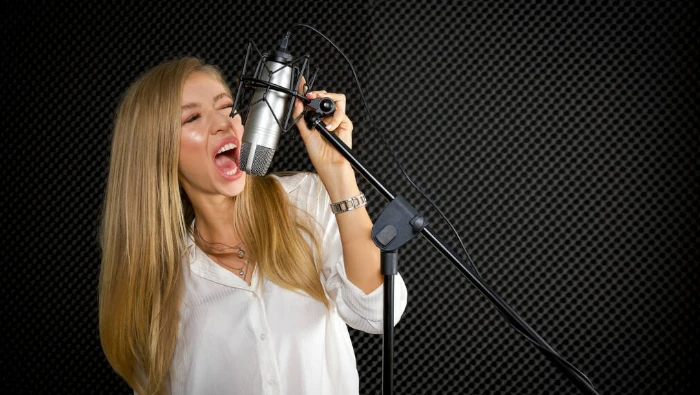
First up on our myth-busting journey…
First up on our myth-busting journey is the notorious ‘dry sound‘ myth. To the uninitiated, it may seem like a sound rule of thumb: wipe out all ambient noise, eradicate every echo, and you’ll achieve the clearest, most pristine audio. Simple, right? But hold on—does this logic truly hold up when put to the test?
Pause and picture this: you’ve draped your recording room corner-to-corner with foam, suffocated every surface to kill reverberation—and now you’re convinced your recordings will be top-notch. But have you considered this might just backfire? Those echoes you’re so keen on capturing are natural, an intrinsic part of how sound interacts with its environment. In the quest for purity, we might end up stripping the life right out of our music.
What your setup craves isn’t severe sound austerity, but balance. Think of studio acoustics not as an enemy but as a tool—one that, when understood and utilized correctly, can enhance the innate qualities of your sound. It’s about embracing a bit of that natural reverb that lends authenticity and depth to your recordings, a far cry from the flat, lifeless results of an overly “dry” recording space.
The truth is, achieving that ‘perfect sound’ isn’t about absolute elimination, but about control. It’s about understanding the nuances of sound reflection and diffusion. This is where exploring and testing the acoustics of your space becomes valuable. Adding selective absorption where necessary, perhaps a diffuser or two, can transform the same room that once produced hollow, boxy audio into a capable mini recording studio, rich with sound that’s true to life.
As we move forward, bear this in mind: acoustics is a science and an art. As you take your next steps in setting up your space, aim not for a bone-dry sound, but one that breathes—with the vibrancy and dynamics that you, the artist, intend.
Myth #2: High Price, High-Quality Fallacy
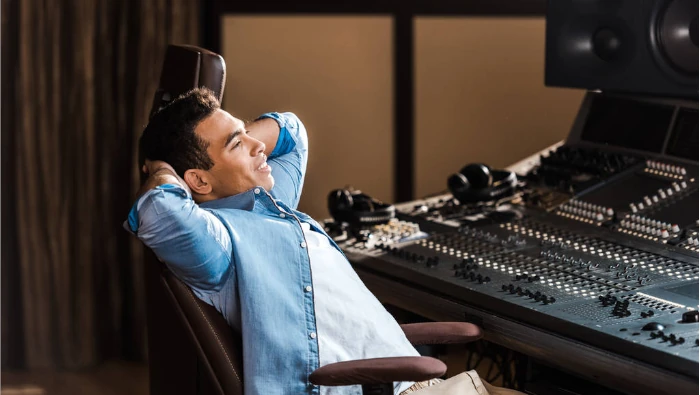
Next, let’s sidestep from acoustics to gear with myth number two—the irresistible allure of expensive equipment. It’s a widespread belief: to assume that shelling out loads of cash for high-end gear will instantly guarantee audio gold. But is there truth to this, or is it just another illusion that needs dispelling?
Let’s face the music—price tags don’t always sing the melody of quality. Sure, premium equipment typically offers more features and robust build quality, but does this translate into a night-and-day difference in your recordings? Not necessarily. In fact, many affordable audio interfaces, microphones, and other essentials can produce stunningly clear and professional-sounding tracks. So, it’s not just about how much equipment costs; it’s about knowing how to use what you have to its maximum potential.
Moreover, do not overlook the compatibility and practicality aspects. Expensive gear might give you a momentary sparkle in the eye, but they can also bring a world of complexities—like incompatible drivers and esoteric troubleshooting rituals that feel like dark magic spells. Opting for popular and widely-used equipment can save you from these headaches. Plus, you benefit from a community of users who’ve field-tested the equipment, shared tips, and created tutorials.
In essence, let’s shift focus from the price tag to performance and community support. Your studio gear should be a tool to help you capture your creative vision, not an obstacle course of financial strain and technical difficulties. Remember, expensive does not always equal better in the grand symphony of audio production.
Myth #3: Instant Perfection Expectation

Finally, we arrive at a myth that deals with expectations—the hope that your first recordings will be flawless masterpieces. Does the dawn of your studio equate to instant hit-making? Here’s where we delve into the significance of skills and knowledge over fancy equipment, and how mastery, patience, and a unique formula can lead to exceptional results.
The Illusive Instant Hit
Let’s get real for a moment. The idea that with just the right gear, each recording session will yield gold right from the get-go is a fantasy. Indeed, the tools of the trade are integral; however, they’re just part of the complete picture. Think of them as brushes for a painter—they can’t replace technique, experience, and creative flair.
The True Proportions of Production
Diving deeper, let’s crunch some numbers. Consider the equipment inside a mini recording studio as only 20% of the equation, leaving a whopping 80% dependent on the producer/audio engineer’s skills. This perspective shift is fundamental. It firmly places the emphasis on practice, learning, and honing your production craft rather than solely on accumulating gear.
Investing in Your Audio Abilities
I cannot stress enough the importance of investing time into developing your audio production skills. Whether you’re learning new techniques, becoming familiar with your DAW (Digital Audio Workstation), or just playing around with different sound textures, this is where your focus should be. Don’t be disheartened by less-than-perfect early attempts; each session is a building block towards your growth as a producer.
Consistency Beats Perfection
In a world that often peddles instant gratification, it’s crucial to remember that consistency is your best friend. Delivering a perfect recording on the very first try is as likely as winning the lottery – possible, but exceedingly rare. Embrace the process, be patient with yourself, and remember that improvement comes through commitment and continuous learning. Every mix, every edit, and every track you lay down contributes to your skills.
So, let’s put away the myth of instant perfection and roll up our sleeves for the more satisfying reality of artistic development. After all, the most resonant and influential music often comes from the journey, not just the destination.
The HSS Formula: A Production Game-Changer
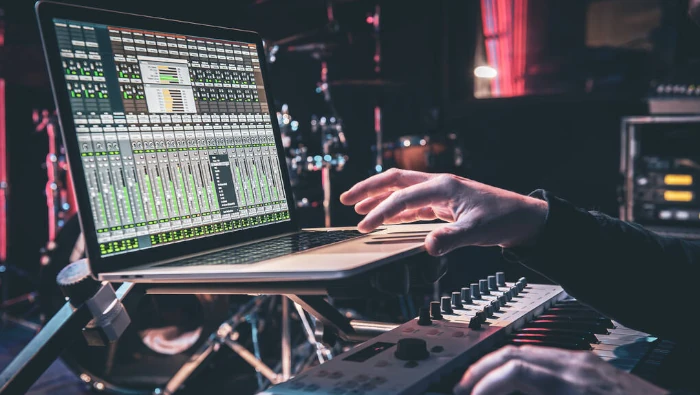
Excitingly, there’s a silver lining to the cloud of initial challenges – the HSS Formula. While the mention of a mathematical algorithm might have some raising an eyebrow in scepticism, trust me, this isn’t about crunching numbers or complex calculus. It’s a standardized approach to mixing that has the potential to revolutionize the production process in your home studio.
Imagine having a roadmap or a cheat sheet that guides you in resolving 90% of your mix issues before you even listen to the track. That’s the magic of the HSS Formula. Developed through extensive testing and the collective experience of seasoned audio engineers, this method brings together a blend of acoustics theory, software utilization, and hardware capabilities.
This technique is all about anticipation and preemptive decision-making. It enables you to forecast how different elements of your mix might behave, thus allowing you to make informed choices before laying down the first recording. The HSS Formula embodies simplicity but it’s supported by an intricate understanding of audio production.
If this sounds a bit technical, don’t fret. In essence, what this formula provides is a clearer path to achieving a sound that’s both authentic and professional—without the trial-and-error agony that can often plague beginners. By adopting this approach, you lay a solid groundwork for your music and make your production process more efficient and, ultimately, more rewarding.
Embrace this game-changing formula and allow yourself the freedom to focus on the creative aspects of your music production. With the HSS Formula in your toolkit, you’re not just making music; you’re crafting sonic experiences that resonate with your audience.
Stepping Stones to Success
If you’re feeling overwhelmed, take a deep breath – everybody starts somewhere, and Rome wasn’t built in a day, right? The key to any successful venture, including your journey in audio production, is embracing growth one step at a time.
Continuous learning is the cornerstone of your progress. You’ve got a plethora of resources at your fingertips; whether it’s tutorials, online courses, or community forums. Every bit of new knowledge you gain is another tool in your arsenal, ready to enhance the quality of your audio productions. So, invest in your education – it’s by far the best piece of equipment you could ever own.
Remember, the gear you have now is just a part of the bigger picture. Even the most modest setup can produce professional-grade audio if you know how to use it right. Experiment with different techniques, play around with the software, and don’t be afraid to tweak and twist knobs until you discover what works for your unique sound.
It’s easy to fall into the trap of gear lust, but let’s keep our eyes on the prize. Striving for improvement in your skills will pay off far more than any high-end microphone or mixer. After all, the clarity of your recordings will ultimately come from the clarity of your knowledge.
Stay committed, patient, and innovative. With each passing day, you’ll not only improve your craft, but you’ll also learn to extract the very best from the equipment you’ve so carefully chosen for your mini recording studio. What matters most is your passion and persistence. Keep at it, and one day, you’ll look back at your early works and marvel at just how far you’ve come.
Conclusion: Debunked Myths and Your Next Moves
Embrace the start of your musical journey with enthusiasm and the right information.
In closing, gears in motion and spirits lifted, we’ve dismantled three major myths looming over the horizon of our mini recording studio dreams. No longer should the quest for ‘dry sound’ ensnare your creative instincts nor should the shiny allure of expensive equipment dictate the quality of your recordings. Furthermore, let go of the belief that perfection graces us at first try; in the realm of audio mastery, patience and practice reign supreme.
It’s time to step forward with a new mindset. Armed with a clearer understanding and the debunked fallacies behind us, you’re now poised to make informed choices and strategic investments—not just in your gear but in your skills and knowledge. Remember, what you bring to the table as a producer or audio engineer is the true essence of your mini recording studio’s potential.
Keep refining your craft, stay updated with industry trends, and don’t shy away from experimenting with the HSS Formula or other production techniques. Each track you lay down is a learning experience, a stepping stone to your eventual success. Your studio, no matter how modest, holds the key to unlock a world of musical wonders if you’re willing to explore it.
So, what are you waiting for? Dust off that equipment, fire up your passion, and stride confidently into the adventure of building and growing your own recording space. Whether you aim to grace the digital shelves of Spotify, serenade the listeners of iTunes, or simply captivate the hearts of a local audience, your journey starts now. Embrace it wholeheartedly, because the beat goes on, and so will you!
